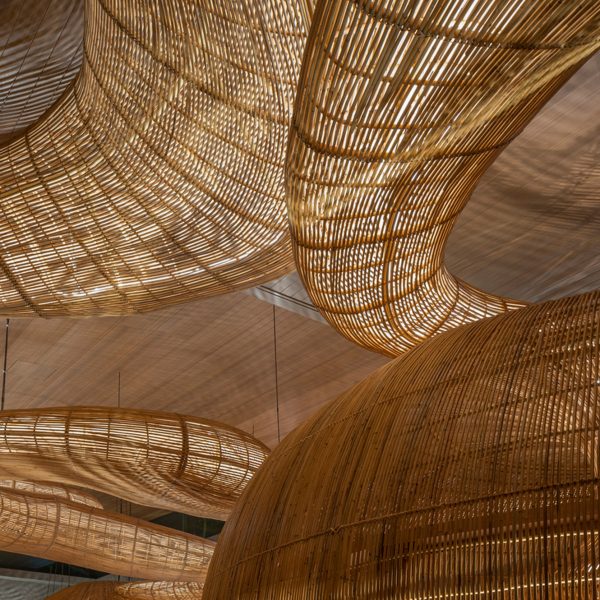[ad_1]
Architecture studio Enter Projects Asia has completed a private gallery for a collector in Chiang Mai, Thailand, featuring an undulating rattan structure designed by an algorithm that weaves its way in and out of the building.
The 2,000-square-metre gallery complex comprises gardens, water features and a series of pavilions for displaying the owner’s collection of silverware, fine china and porcelain, including what is reportedly the largest collection of Wedgwood porcelain in Southeast Asia.
Enter Projects Asia, which is based on the Thai island of Phuket, developed a holistic proposal for the project that spanned everything from spatial planning to lighting and furniture, with the fluid rattan structures providing a consistent element throughout the scheme.
The aim was to create a less “clinical, antiseptic” interpretation of a traditional gallery, based on the studio’s research into parametric design and dynamic forms, Enter Projects Asia director Patrick Keane explained.
“We sought to create an immersive experience, giving the space a warmth and depth uncharacteristic of conventional art galleries,” he said.
The gallery features two wings arranged on either side of a central entrance. Each wing contains an exhibition space, with a private dining area also accommodated in the larger of the two volumes.
The rattan installation begins at the entrance and traces an overhead route through the building, seamlessly transitioning between inside and outside.
At several points, the suspended structure drops down to create bulbous open-sided pods, incorporating shelves for displaying artworks and objects.
The installation‘s complex form was generated using generative design software and is intended to simulate the movement of clouds and steam.
Its shape seems to change constantly when viewed from different perspectives, adding visual dynamism to the interior.
Lighting integrated within the overhead structure creates a warm glow both during the day and night, while concealed lights illuminate the display areas.
The three rattan pods – measuring five, four and three-and-a-half metres in height respectively – were fabricated in a factory during the coronavirus lockdowns before being transported to the site and assembled.
Enter Projects Asia regularly works with rattan palm, which is a naturally abundant resource in the region. Previously, the studio produced a similarly sculptural wickerwork installation for an office and factory building in Waregem, Belgium.
During the pandemic, the practice also launched an initiative called Project Rattan that focuses on creating bespoke rattan furniture and lighting using local craft skills.
According to Keane, the fast-growing palm species are well suited to use in interior design, offering a sustainable alternative to conventional building materials.
“It is not hard to be sustainable in construction if we adapt to our environment,” he said. “Why would we use synthetic, toxic plastics when we have all the noble materials we need at our fingertips?”
Keane founded Enter Projects in 2005 after completing his studies in Australia and the USA. Since relocating to Asia, the firm’s projects aim to combine a focus on innovation with a strong sustainable agenda.
Previously, a rattan studio the practice designed for yoga brand Vikasa was named leisure and wellness interior project of the year at the 2020 Dezeen Awards.
The photography is by William Barrington-Binns.
[ad_2]

